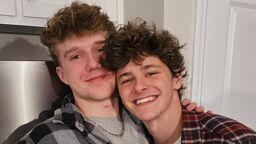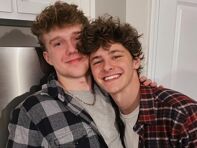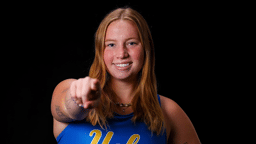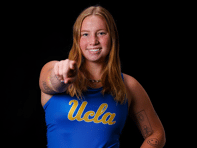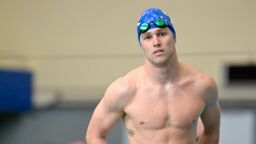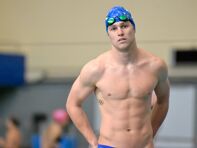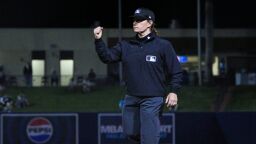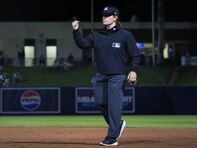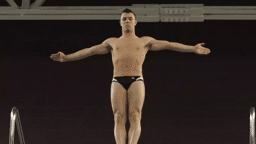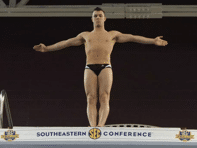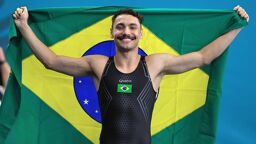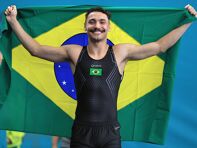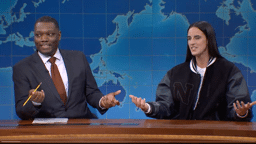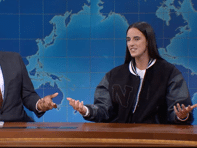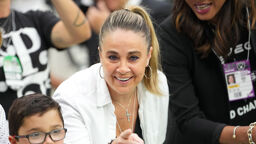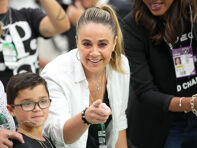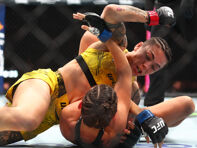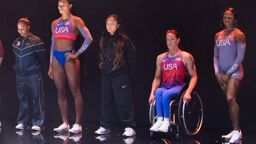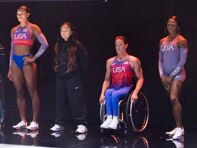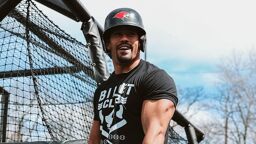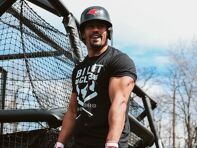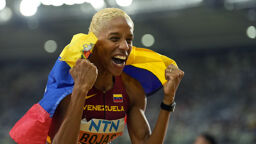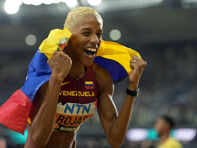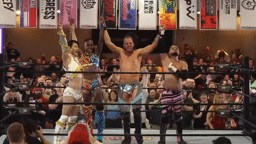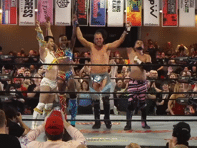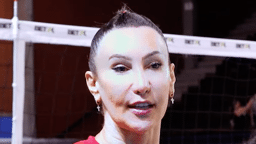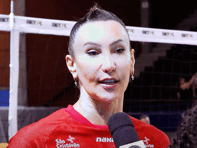Before the COVID-19 pandemic shut down production I was working on a documentary project with openly gay Canadian sports radio host Scott MacArthur, and something he said stuck with me: “When you’re in the closet, your life becomes a series of compartments, molding yourself to fit each situation but never getting to live.”
When I was a kid, I wasn’t a hockey fan. I liked going to the rink, getting a cup of hot chocolate and watching my brother play goalie in our local league but that was it.
Growing up, being diagnosed with autism at 4 years old, I was always the weird one in school. I took classes to learn how to talk to kids my age and the big lesson they gave was to have common interests.
I knew what hockey was, I knew other guys in my school liked it so one day I just went up to one guy, and just said: “Did you see the Leafs game on Saturday?” And we had a normal conversation.
That day I learned that if I could talk about hockey, be a “hockey fan” like the rest of the guys, maybe even play, then I had a way to make friends.
I took this discovery and ran. I researched players, stats and history as far back as I could find. Every Saturday Hockey Night in Canada game became must-see TV. For Christmas, my parents bought me a Leafs jersey with my name on it and it became my prized possession because I could wear it and be “a hockey guy.” The next year I started to play on the ice. It wasn’t much but it gave me a desperately needed confidence boost.
The first time I heard someone get called a faggot was on the ice when I was 11.
Hockey was not where I learned what homophobia was, but it was the place closest to my heart where I quickly learned how easy it was accepted.
I’d truly fallen for the game though. I loved being part of something that just made life feel normal. On the ice, my lack of ability meant my teammates took pride in sticking up for me if someone came at me.
By the time I hit the eighth grade I began to realize that I was finding the boys in my grade more attractive than the girls. I had heard the jokes and the cracks in the dressing room when I played. I heard the swearing on the ice. I heard it in the stands at the games. I heard it among my hockey friends making jokes about a particular player.
What the world showed me was that if you were involved in hockey, being gay was an insult, a way to make someone feel less than. This terrified me because this was my space and the only place life was normal.
I decided I just wouldn’t be gay. I thought if I went into high school and leaned into the masculine hockey stereotype then eventually these other “wrong” feelings would disappear.
That’s what I did freshman year. I would ask girls out on dates, but nothing would ever come of any of it because I wasn’t attracted to them. My friends would ask me how my “dates” went, and I would make up some crazy story because that’s what I thought I was supposed to do. I tried for so long with so many girls, but I barely knew how to talk to them.
It only got worse whenever I entered my safe world in the rink. I would hear guys on the bench call an opponent “gay” or a “fag” and I would join in and then laugh along with them when they said the same things back in the dressing room.
At the same time every time I heard those words, I would wince, terrified to ever have them directed at me. I was in a space where I allowed myself to think and say things that I knew were wrong but was so desperate for acceptance, and hockey gave me that.
I remember one day when I was talking to a friend after school telling a made-up story from a date that didn’t happen. After we’d said goodbye, thoughts started creeping into my mind, first quietly and then getting louder and louder, bouncing around as if I had an angel and devil going back and forth inside my brain.
“You’re a liar.”
“You’re doing it for your own good.”
“Why can’t you just be honest with yourself?”
“Tell the truth, but they’ll hate you if you do.”
I could just feel my chest tighten each time the thoughts crossed my brain. I kept walking home and they kept repeating over and over in my head. My chest got tighter and tighter as if I was having a heart attack until I got home. I ran up to my room, went into my closet, pulled out my jersey, looked at it and just started to cry. I had so much hatred for who I was, I didn’t understand who I was trying to be, and the only part of me that I did understand I was ashamed of.
Still, I kept playing the game and it kept eating at me. I had always done well in school but my grades fell because I couldn’t bring myself to care.
I’ve always loved to write and managed to score my first writing job on a sports website, but I was a misogynistic asshole to my female editor and got fired quickly.
I compartmentalized. I put on my best face around people but would go home alone and empty.
I compartmentalized. I put on my best face around people but would go home alone and empty. Being around hockey became the only place I could find comfort, but I kept spiraling.
I would go on hockey message boards and start arguments just to call people fags for fun, and I’d go to the rink, laugh along, and join in whenever I heard those words. I was so desperate to be seen as “tough” that I planned to try to harm myself. At 15 I devised a plan where I would use a hammer to break my foot just so I could get a cast, go to school and pretend it happened during hockey. I got so far as bracing my foot between two bricks before I realized the insane thing I was about to do.
In 2016, I was allowed to give a TEDx Talk. Just for kicks one night I’d pitched a proposal about growing up with autism, bullying, and mental health. Somehow it got accepted and in October 2016 my dad and I drove to Chatham-Kent, Ontario, for me to speak.
A few months later the video was released and for a week I became the talk of my school. In each class, my teachers played the video, and others invited me to theirs to present it.
Every time it played, I felt like an absolute fraud. I was hiding the darkest part of my life, and preaching to others about mental health awareness.
Thanks to my poor motor skills I wrote most tests and assignments in the special ed offices at my high school. It was there I grew close with one of the teachers whom I saw nearly every day. For the most part, we had a normal relationship but I can remember sitting in that room with her crying. I would lie and say it was from schoolwork stress, but just to be able to let some of it all out helped a lot.
Senior year I rescued my GPA and finally gave school some effort again because I had what I thought would be my solution — to go to Ryerson University to study Sport Media. I thought I could get a fresh start, leave everything else behind, fully throw myself into my world and that’d be it.
For a while it was fine, but eventually that self-doubt, that self-hate and that fear returned. I was at a place where I wouldn’t even try anymore. I would just joke with the few friends I’d made about what I had “done” and go home. My first midterms were awful. I would stay out late but not to drink or do drugs, just to be around people, to not be alone
My parents were at a loss, unable to figure out why I suddenly was so disinterested in everything, but they chalked it up to the stress of a new school and I was somehow still too ashamed to tell them. Going to school in downtown Toronto I had never felt more surrounded and yet more alone.
One person I met at that time stuck out for me. At Ryerson, there is a production crew called Rams Live. This team handles all of Ryerson Varsity Athletics live Broadcasts. Since I had volunteer experience in television production, I went to go help out

There I met a guy, one of the crew leaders, and he was openly gay. We didn’t have a profound conversation, he wasn’t the person I came out to first, but he was just somebody out and working through the world I was faking my way through.
It took two and a half months for me to work up the courage and many sleepless nights, but one morning at end of November 2017, I said fuck it and group-texted a couple of my hockey friends that I was gay. They were cool with it and at that moment that little dose of acceptance gave me the courage to privately come out to my brothers and then one at a time to my parents.
I thought that I was fixed, that everything would be normal, but I still kept my sexuality hidden from the rest of my world. My bosses at Rams Live had hired me to be a crew leader but every time I entered the studio, even surrounded by friends, those nerves, that tightness all just kept coming back over and over. That self-hatred I felt hadn’t gone away because I was still compartmentalizing.
Finally, in the middle of October 2018, I took a walk to the old rink I used to play at, sat down, and took some time to think. I thought about that scared kid I once was, about the person I had pretended to be and in a spur of the moment pulled out my phone and wrote a letter to him. I let him know that I acknowledged all of the pain that he felt but that I had to let myself live. I finished writing, posted that letter onto Instagram, got up, and continued on my walk.
The reaction was overwhelmingly positive but what struck me came two nights later. I entered the studio at Maple Leaf Gardens, saw everyone and no one said anything because they didn’t need to. At most, they gave me a simple smile as if to say, “you’re here, you’re OK, you’re still you.”
Today, I am a year and a half clear of being out, and I’m in a better place.
Today, I am a year and a half clear of being out, and I’m in a better place. I continue to work as a broadcast crew leader and write for 49-Sport, which covers Canadian college sports and the NCAA.
Even now I know I’m not where I want to be. I still struggle to talk about the dark places I reached, and every so often, I’ll hear someone make those same homophobic jokes that I heard and used to believe, and a little bit of those nerves, that tightness and that fear come back, but I’m in a place where I can finally say I’m proud of who I am.
I am also healthier than I’ve ever been. A month after I posted that letter, I committed to turning my health around and in the last 18 months have lost 60 pounds.
My biggest regret is suffering in silence for so long when I know I didn’t have to. I was lucky enough to have a family who embraced who I was. I’ll never forget what my mom told me the day I came out: “I don’t understand it, but it’s you and that’s all I care about.”
Hockey is no longer central to my life, and the main way I define myself. I’ll watch when I want to, but Leafs games are no longer mandatory viewing and the jerseys in my closet stay there rather than being a regular part of my wardrobe.
Mostly I’ve just allowed myself to live a life outside of hockey. I’ve been learning how to cook, I’ve made exercising a part of my regimen, I’m slowly getting back into the music I used to play, I added a minor in political science to my degree, to study my newly discovered second passion in municipal politics.
I’m finally at a place now though where I want to be able to help people in the LGBTQ+ community in sports. I plan to continue to find ways to help amplify voices in the LGBTQ+ community whether in writing, on-air or on video.
If I could go back and talk to young me, I would tell him that hockey is not life, no matter what it may look like. There is a world outside the rink, the stands, the press box and the studio and it’s not worth destroying your mental health over.
The sooner we talk and realize we aren’t alone, the more we can help each other.
Richard Coffey, 21, is going on to his senior year at Ryerson University studying sports media with a minor in political science. He is a broadcast crew leader for Ryerson Rams Broadcasts on www.oua.tv, and also a staff writer for 49-Sport. He can be reached via Twitter at @_Rich_Coffey or via email at [email protected]
Story editor: Jim Buzinski
If you are an out LGBTQ person in sports and want to tell your story, email Jim ([email protected])
Check out our archive of coming out stories.
If you’re an LGBTQ person in sports looking to connect with others in the community, head over to GO! Space to meet and interact with other LGBTQ athletes, or to Equality Coaching Alliance to find other coaches, administrators and other non-athletes in sports.
If you are considering suicide, LGBTQ youth (ages 24 and younger) can reach the Trevor Project Lifeline at 1-866-488-7386. Adults can contact the National Suicide Prevention Lifeline at 1-800-273-8255 24 hours a day, and it’s available to people of all ages and identities. Trans or gender-nonconforming people can reach Trans Lifeline at 877-565-8860.



